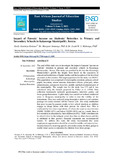Impact of Parents’ Income on Students’ Retention in Primary and Secondary Schools in Kakamega Municipality, Kenya

View/
Date
2022-09-26Author
Kotiano, Emily Nasimiyu
Immonje, Margaret
Mabonga, Joash W. S.
Metadata
Show full item recordAbstract
The goal of this study was to investigate the impact of parents’ income on students’ retention in primary and secondary schools in Kakamega Municipality - Kenya. This study was justified by the fact that Kakamega Municipality’s growth has largely been based on the expansion of educational institutions of higher studies and the inception of the devolved structures in the counties. The target population for the study was 99,987. This population was comprised of municipality residents, primary school pupils, secondary school students, Education officers, principals, urban administrators, and parents from low, middle, and high residential parts of the municipality. The sample size for the study was 172 and it was calculated using the formula proposed by Fisher et al. (1998). Data collection instruments included; questionnaires, interview guides, and focus group discussions. A pilot study was carried out in three residential areas in Bungoma municipality in order to test the validity of the instruments. Data was analysed using descriptive statistics and statistics package for social sciences (SPSS) version (20). The study established that poor income by parents results in low school retention as children engage in cheap labour with their parents for school fees. This is confirmed by low-class respondents, of whom the majority earn between 10,000 -30,000 (42%) and below 10,000 (26%) and as a result, there is low retention in education by their children at (6%). Child’s retention rate in school is low in the indigent social class than in other classes and this is attributed to their parent’s financial constraints and environmental factors. To address this state, the study recommends that more employment opportunities should be created for middle and majority low-income classes by reserving specific jobs in the county for these groups to enable better access to education by children from these groups.
URI
https://doi.org/10.37284/eajes.5.3.858https://journals.eanso.org/index.php/eajes/article/view/858
http://ir-library.mmust.ac.ke:8080/xmlui/handle/123456789/2128
Collections
- Journal Articles [411]
